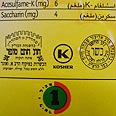
The slaughter of animals is being attacked. Rights activists, the education system and governments have come to realize over the past few decades that animal welfare is not an abstract right and must be protected by ethical codes and the law.
Against the backdrop of this development, it is nice to know that we were there first. Way before Israel enacted the Animal Welfare Law in 1994, the Mikrah and the Talmud obligated us to prevent the unnecessary suffering of animals.
An undercover researcher for Channel 2's investigative program Kolbotek worked at Tnuva's Adom Adom slaughterhouse in Beit She'an and documented the use of electric cattle prods and rods to control the cattle – in violation of both the law and the Halacha. But no one was surprised that the Kashrut supervisors and slaughterhouse workers at the site did not care about the animals' suffering.
The rabbinical-Orthodox institution's kashrut regulations refer to cutting and gouging. These laws do not take the animals' suffering into consideration, just as they do not address the rights of employees at a restaurant that delays the payment of salaries.
But Jewish tradition is much broader than the narrow shoulders of the Chief Rabbinate. One example is the Conservative Movement's Magen Tzedek (Shield of Justice), a complementary certification for kosher food produced in the United States in a way that meets Halachic standards for workers, consumers, animals, and the environment. In Israel, on the other hand, the Orthodox monopoly protected itself through legislation which outlawed the Magen Tzedek seal.
Moreover, in 1983 the Knesset passed the Kashrut Fraud Law, which determined that the Chief Rabbinate is the only body authorized to issue Kashrut certificates in Israel. The animals lost. We all lost.
Jewish and Islamic ritual slaughter avoids unnecessary suffering to animals, but today there exist more humane methods to kill an animal.
People won't stop eating meat, but religions evolve. Should the public debate persist, and if legislation in Israel and abroad will become more advanced and the courts will intervene, it is safe to assume that eventually sociological changes will occur that will allow Jewish and Muslim religious scholars to revise the kashrut and halal laws.
It can happen, particularly within the moderate factions. In order for this to occur, religion, state and politics in Israel must be further separated. Marriage, divorce, conversions and kashrut – we all suffer from the fact that only one interpretation of Judaism is legal in Israel.
Yizhar Hess is the executive director and CEO of the Masorti Movement in Israel















